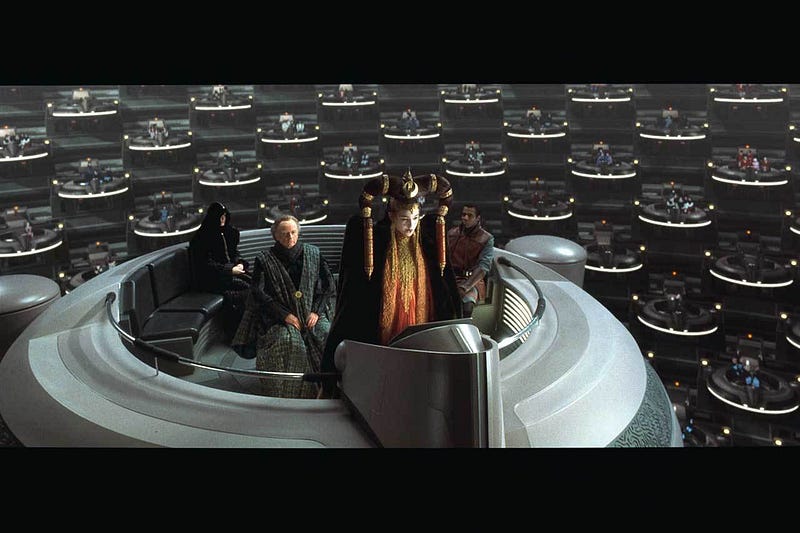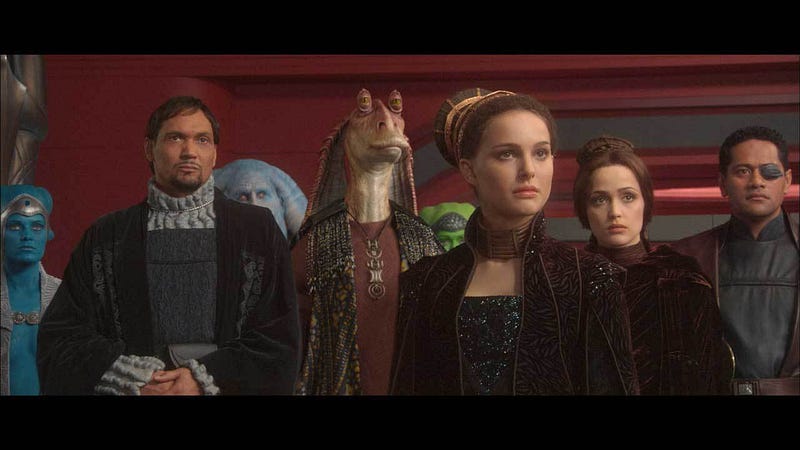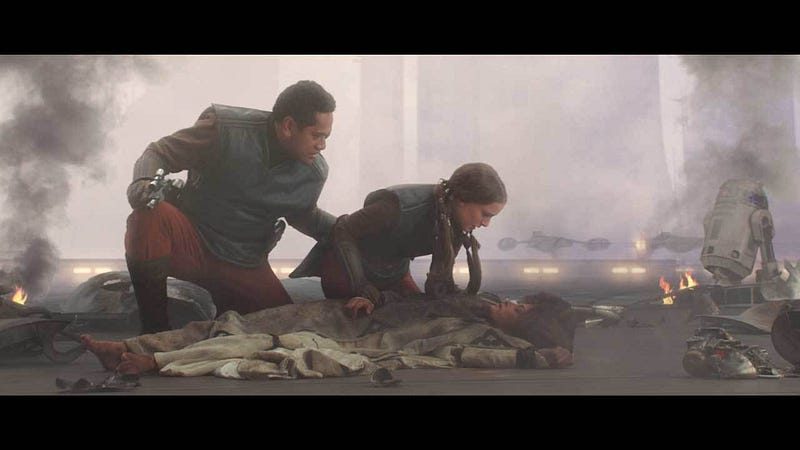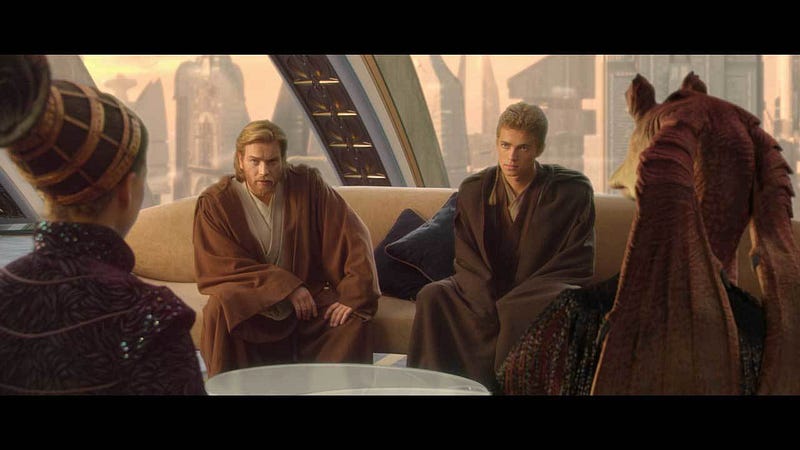The Politics of the “Star Wars” Prequels

The Star Wars prequels are often maligned for their significant use of politics over the action of the original trilogy. However, the political climate and machinations of both trilogies are the very essence of the stories George Lucas was trying to tell — specifically about the responsible use of power.
At its core, Star Wars is not a story about mysticism so much as a tale of “good” and “evil” in all of its forms. As such, I want to break down the struggles of the main heroine of Episodes I-III, Padmé Amidala, whose constant fight for peace and diplomacy never wavered despite the growing tensions and war cries around her.
Big Trouble in Little Naboo

In The Phantom Menace, Supreme Chancellor Valorum sent Jedi Master Qui-Gon Jinn and his Padawan Obi-Wan Kenobi to Naboo to negotiate a dispute between the planet’s Queen Padmé Amidala and Nute Gunray, the Viceroy of the Trade Federation. Gunray had blockaded the world in an attempt to force Amidala to legally accept a planetary occupation.
Wishing to avoid a violent conflict, Amidala considered the needs of her people and contemplated signing the treaty before Jinn and Kenobi freed her and her detail. With their escort, she made her way to Coruscant, the capital of the Galactic Republic, to plead her case to the Senate and have Gunray arrested for his crimes.

When met with laborious bureaucracy (and at the urging of Senator Sheev Palpatine of Naboo), Amidala moved for “a vote of no confidence” in Valorum’s leadership. “I was not elected to watch my people suffer and die while you discuss this invasion in a committee,” she proclaimed. “If this body is not capable of action, I suggest new leadership is needed.”
While the Senate was wrapped up in choosing a new leader, Queen Amidala returned to Naboo to negotiate an alliance with Boss Nass of the Gungans. She then devised a strategy to draw out the Federation army so that she and a small strike team — including Jinn and Kenobi — could capture Gunray and retake the capital city of Theed.
The plan was a success, though not without casualties — most notably Jinn. But Amidala and the Naboo were free from the Federation. Or so they thought.
The Separatist Crisis

Within the decade following the Battle of Naboo, Amidala took over Palpatine’s seat in the Galactic Senate after he was elected Chancellor in The Phantom Menace. Attack of the Clones sees her continuing her political career as her planet’s senator, maintaining her vocal opposition to violent conflict and corruption. Despite her position on the Loyalist Committee, and the growing military threat of the Confederacy of Independent Systems (CIS) (led by Count Dooku of Serenno), she remained the main opponent of the Military Creation Act, a proposed law to fill the void of the Republic’s nonexistent military.

Her opposition continually placed her life at risk. After a failed assassination attempt upon her arrival on Coruscant, she (correctly) suspects that Dooku is behind the attack. “He is a political idealist,” Master Ki-Adi-Mundi tells her, “not a murderer.” Master Mace Windu reassures her that Dooku “couldn’t assassinate anyone” due to his past as a Jedi Master. Nonetheless, Palpatine requests that the Jedi assign Kenobi and his Padawan Anakin Skywalker to protect her.

After the two Jedi thwart a second attempt on her life, the Jedi Council assign Skywalker to escort her back to Naboo while Kenobi investigates a lead on the assassin. “As the leader of the opposition, it will be very difficult to get Senator Amidala to leave the capital,” Skywalker warned. He was right. “I haven’t worked for a year to defeat the Military Creation Act to not be here when its fate is decided!” she argued.
She would later learn that Dooku had formed an alliance with Gunray, as well as the leaders of the Techno Union and the Banking Clan; he was seeking the Commerce Guild and Corporate Alliance to pledge their loyalty to the CIS as well. With this knowledge, and the capture of Kenobi, Amidala, and Skywalker, the Military Creation Act is passed and Palpatine is granted emergency war powers. Master Yoda leads an army of clone troopers to Geonosis to confront Dooku.
“Begun, the Clone War Has”

After the Battle of Geonosis, the Clone Wars were in full swing. Battle lines had been drawn as the Republic and the Confederacy (“the Separatists”) brought conflict throughout the galaxy. For three years, the Jedi led their clones against Separatist battle droids in space, on land, even underwater.
Dooku led the Separatist army along with his apprentice Asajj Ventress and General Grievous. For the Republic, the Jedi led the army, with Padawans (like Ahsoka Tano) assigned as Commanders while Knights (Skywalker) and Masters (Kenobi) served as Generals.
Senator Amidala did not forget her efforts, however. She continued to work to limit Palpatine’s powers throughout the war, to forge diplomatic relations with peace-seeking Separatist leaders, and to send relief aid to war-torn worlds.
Fall of the Republic
During the height of the Clone Wars, Chancellor Palpatine was kidnapped by Dooku and Grievous. Skywalker and Kenobi led a daring rescue during which Skywalker killed Dooku in combat. Kenobi would later slay Grievous on Utapau, effectively ending the war.
Meanwhile, Amidala had met with various other senators, including Bail Organa of Alderaan and Mon Mothma of Chandrila, in order to confront Palpatine over his growing lust for power throughout the war. They were (correctly) disillusioned with him, and secretly discussed the possibility of a resistance should things become too dire. They formed the Delegation of 2,000 to publicly pressure Palpatine to cease his various amendments to the constitution in order to remain in power (something she notes the Jedi disagree with as well).
But it was too late by this point.
Not long after, the Jedi fail to arrest Palpatine and are massacred. He then lies to the Senate, claiming they tried to assassinate him, and labels them enemies of the state. With this, Revenge of the Sith shows Palpatine’s final power play and the loss of hope in the eyes of Senators Amidala and Organa.
“So this is how liberty dies,” Amidala laments as Palpatine declares himself Emperor of the Galactic Empire. “With thunderous applause.”
Want to keep up with The RYM? Like us on Facebook or Follow on Twitter!



